MBA sarpanch Chhavi Rajawat MBA makes impact at UNmeet
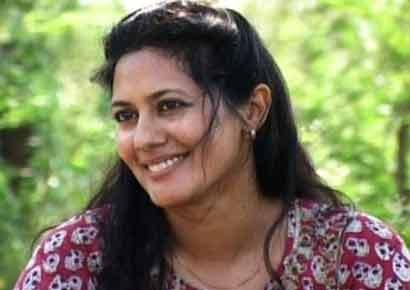 A jeans-clad young woman hardly fits the bill for a sarpanch in rural Rajasthan. And so, Chhavi Rajawat, an MBA, had raised eyebrows last year for literally riding her way through the panchayat election and becoming the sarpanch of Soda village, 60 km from here.
A jeans-clad young woman hardly fits the bill for a sarpanch in rural Rajasthan. And so, Chhavi Rajawat, an MBA, had raised eyebrows last year for literally riding her way through the panchayat election and becoming the sarpanch of Soda village, 60 km from here.
A year later, Chhavi raised the same kind of awe at the 11th Info-Poverty World Conference held at the UN. The two-day panel discussion at the UN held on March 24 and 25 was to highlight how civil society can implement its actions and discussed at length the role of society in fighting poverty and promoting development.
Chhavi, an ex-student of Rishi Valley, Bangalore and Lady Shri Ram College, Delhi showcased the changing face of rural Rajasthan at the meeting.
"If India continues to make progress at the same pace as it has for the past 65 years since Independence, it just won't be good
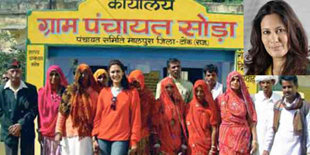 enough. We will be failing people who dream of having water, electricity, toilets, schools and jobs. I am convinced we can do it differently and do it faster," said Chhavi, who pursued her business management in marketing and IT from Pune.
enough. We will be failing people who dream of having water, electricity, toilets, schools and jobs. I am convinced we can do it differently and do it faster," said Chhavi, who pursued her business management in marketing and IT from Pune.
"In the past year alone in Soda, the villagers and I have brought about a radical change in the village purely through our own efforts. We have no outside support no NGO help, no public or private sector help," she shared at the meet.
From a village largely known for its water bodies, Soda was losing them as one after the other water body was drying out. But, after becoming sarpanch, the first task that she took upon herself was to desilt an old water body. The number of people who joined her in the task voluntarily was another instance of her popularity there.
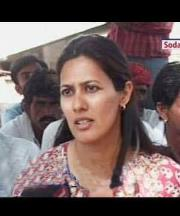 Perhaps the only MBA village head in the country, Chhavi spoke of the necessity to re-think strategies for including new technologies like e-services in achieving the Millennium Development Goals (MDGs) in an era where resources are becoming limited.
Perhaps the only MBA village head in the country, Chhavi spoke of the necessity to re-think strategies for including new technologies like e-services in achieving the Millennium Development Goals (MDGs) in an era where resources are becoming limited.
"I thank United Nations Office for Partnerships ( UNOP) which had deputed its senior adviser in India, Babu Lal Jain, to visit Soda and extend support to open the first bank in the village. That made all the difference," she said adding, "In three years, I will transform my village. I don't want money. I want people and organisations to adopt projects in my village as often projects fail owing to lack of a local connect and that is what I am here to provide a bridge in that gap."
Source : Times of India. TNN, Mar 28, 2011, 05.03am IST, JAIPUR
-------------------------------------------------------------------------------------------
Chhavi Rajawat – The MBA Village Head
Chhavi Rajawat, who was elected Soda’s sarpanch (village head), says her priority is making the villagers self-reliant and building reservoirs for rainwater harvesting
Chhavi Rajawat is an example of women who believe in breaking the stereotypes. Shunning the allure and authority that comes with any high-profile job, this 30-year-old with an MBA degree and an envious job portfolio sprang a surprise on everyone last year by fighting the village panchayat polls. She won!
Chhavi is now sarpanch of Soda, about 65 kilometres from Jaipur in Rajasthan. The corporate-girl-turned-sarpanch recently attended the United Nations 11th Info-Poverty World Conference. She was invited to get an insight into the struggles of developing rural India and how Millennium Development Goals could be met.
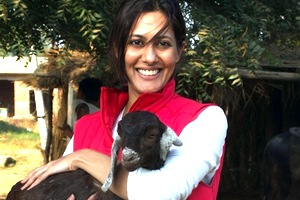 Soda village comes under Tonk, an erstwhile princely state now considered one of the most backward districts of Rajasthan. Rajawat works in this nondescript village and is showing its residents how they can transform their lives by changing their mindset.
Soda village comes under Tonk, an erstwhile princely state now considered one of the most backward districts of Rajasthan. Rajawat works in this nondescript village and is showing its residents how they can transform their lives by changing their mindset.
The young and vivacious sarpanch, who had earlier worked with prestigious companies in various capacities, goes to the dusty bylanes of the village, which has a population of 6,000. Unmindful of the awe with which the villagers initially looked at her, she has made herself comfortable among them. It would be no surprise if Rajawat said she had slightly higher aspirations than what her educational degrees provided.
Excerpts from an interview:
It is quite revolutionary to see a well-bred girl working among the villagers. What led you to this?
Revolution seems to be a habit in the Rajawat family. Years ago, my grandfather Brigadier Raghubir Singh, the 1965 Indo-Pak war veteran, did his bit of adventure. He made his daughter-in-law (my mother) drive through the village without a veil. This was unheard of in the highly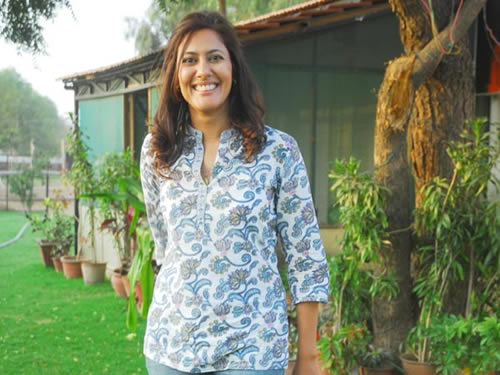 conservative village and had shocked villagers into silence!
conservative village and had shocked villagers into silence!
After retirement, my grandfather was unanimously elected sarpanch three times consecutively. Twenty years later, I made him proud.
There may not be many people who believe in pursuing a career in making the lives of villagers better but today's politics require educated youngsters, with their urban knowledge and experience, to inject life into rural areas and reshape them.
What lessons did you learn from your UN visit?
 It was very encouraging to realise how so many organisations stand ready to offer support to developing and underdeveloped regions once a proper dialogue is initiated and mutual goals aligned. However, unfortunately, where the need is greatest, communication is weakest. I am trying to bridge that gap to help develop rural India. People agreed with me that for projects to be executed, a local person was needed to connect the development agencies and grassroots-level people.
It was very encouraging to realise how so many organisations stand ready to offer support to developing and underdeveloped regions once a proper dialogue is initiated and mutual goals aligned. However, unfortunately, where the need is greatest, communication is weakest. I am trying to bridge that gap to help develop rural India. People agreed with me that for projects to be executed, a local person was needed to connect the development agencies and grassroots-level people.
As sarpanch, what were the gains of this visit in terms of serving the people further?
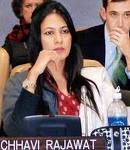 I was able to put my ideas across on an international platform and give them a better understanding of the issues we face. I worked hard to make a very comprehensive presentation and am grateful for the attention bestowed upon me by the participating members. I hope the efforts will be rewarded by having people and organisations adopt our village projects, as rural development cannot happen without outside support.
I was able to put my ideas across on an international platform and give them a better understanding of the issues we face. I worked hard to make a very comprehensive presentation and am grateful for the attention bestowed upon me by the participating members. I hope the efforts will be rewarded by having people and organisations adopt our village projects, as rural development cannot happen without outside support.
I also hope my visit will be a catalyst to attract educated and competent youngsters to come up and help villages across India. It will, no doubt, elevate the profile of dedicated sarpanchs across the nation and get them the respect they deserve.
Initially, was it difficult for people to accept a woman as the village head?
Being a daughter of the village, it wasn't difficult within Soda. Though interacting with outsiders and local politicians I did sense resistance from a few. I understood that with their conservative attitude and outlook towards life, it would be a bit difficult, not impossible, to relate to them.
Fighting the system can be a difficult task anywhere. But villagers should not be underestimated.
It is their foresight that forced and inspired me to become their sarpanch. My degree in business management proved to be an asset. Now they are benefiting, as their earnings have increased considerably under the government's National Rural Employment Guarantee Scheme.
What is your focus area vis-à-vis Soda?
My main aim is to create awareness among the villagers and make them self-dependent. People have a tendency to sit back and say it is the government's responsibility to look after them. This attitude won't help. But fortunately, after having worked with the villagers for more than a year, a lot of them know about their rights, though not their responsibilities! I am trying to make them aware of their duties as well.
I do not think twice before admonishing them to work for themselves. It's important for them to realise and develop rural areas if they are serious about preventing migration of the village youth to urban areas.
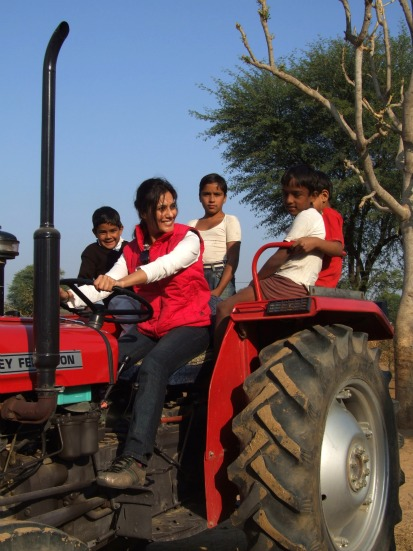 Do you get any support from womenfolk?
Do you get any support from womenfolk?
They are immensely supportive and confident and I have developed a good rapport with them. My line of functioning is direct. I do not believe in having mediators and have one-to-one interactions with the villagers. Also, since Soda is my ancestral village, I am familiar with its problems. It might be too ambitious a plan but I intend to change the face of rural Rajasthan, which has a dubious record on women's rights and literacy.
What plans, if any, do you have regarding water in the parched state of Rajasthan?
Rainwater harvesting is a priority. I am working towards building reservoirs to conserve and save rainwater from overflowing out of the village. The dry lakes in the village will come in handy and in due course the neighbouring villages can also be supplied water from these reservoirs.
The villagers here are dependent on agriculture for their livelihood and have to wait for the monsoons. The water available here is not only unsafe for drinking, it also has even been declared "unsafe for irrigation". It is saline and highly contaminated. Because of this, many people suffer from dental and skeletal flourosis and other diseases. All this needs to be looked into.
Do you find any change in the villagers since you began working with them?
Yes, I see a sea change in them. The villagers have begun to not only question but provide valuable inputs for development.
Courtesy : Gulf News Weekend Review
---------------------------------------------------------------------------------------------------------------




